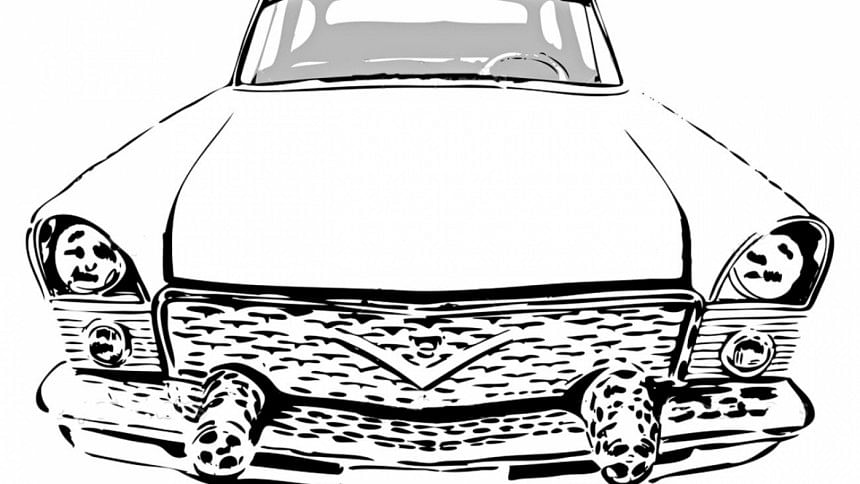DRIVING MY FATHER'S CAR

With Led Zeppelin blasting from my speakers, I didn't notice the sound of a car's engine pulling into our driveway. In those days, it was common to have cars coming to our house late into the night; it had been that way since father moved his private practice to our garage, which had been redecorated to look like a proper doctor's chamber. So I went about doing my regular teenage things in my regular teenage ways, ignorant of the information that was about to be delivered to my parents downstairs.
At the age I was at, I had that attitude that all young people had about danger. I just didn't believe it would strike me. It could hit the person next to me and the one behind me, perhaps, but not me, never. So while I was scrolling through the computer screen, half hoping for something exciting to show up, my attention got diverted by the sound of a scream. It was mother; there was no doubt about it. The common impulse would be to run downstairs in a hurry. I did go downstairs but in a very calm fashion. It was beyond me to think something genuinely bad had happened to us. Mother was probably just over-reacting. It was probably just a rat, a broken teacup or something along those lines.
So my father had had a stroke.
It was funny really, the way the news got to me. For my part, I didn't even know he wasn't home. He usually kept himself locked up in the garage-chamber, so we rarely saw him in other parts of the house. My next thought was that even if the stroke had happened it was surely just a minor thing brought about by age and overwork and it would, slowly but sure, pass and things would be back to normal. But the person who had been the bearer of the news, one of my dad's many interns, didn't look like he was going to add something positive to the initial piece of news.
"It's just a minor stroke, right?" I asked, putting emphasis on the 'right'. I often tried to use suggestion when nervous. Perhaps if I led them in the direction of a particular answer, it would increase the likelihood of fate somehow twisting the circumstances in that direction. All the while my mother kept wailing and sobbing in the background.
The man (or boy you could say, he wasn't much older than me0 shook his head. "The situation was critical. He's moving in and out of consciousness. He didn't want us to tell you. But we didn't want risk it." I could tell he regretted saying that last bit. Nobody likes being the bearer of bad news. Good news, yes, even if they had no part to play in it. Bad news? Never.
Something that made me feel very grown up at that moment was that despite being faced with the reality of losing my own father, I was concerned more about this intern's very visible discomfort. I wanted to relieve the poor guy. He didn't need to take anymore of my mother's wailing. But at the same time I wanted him there. Having someone else there made me feel less alone although of course he'd never feel it the way we would if father never recovered. He would perhaps send me a sympathetic text message, put up a Facebook status about how educational it had been to work under father. Pretty soon he'd be transferred to work under someone else and we would probably never see him again. Let him suffer for now.
Mother was inconsolable. She's the sort who'd get headaches over a broken teacup. In contrast she was reacting pretty well to the prospect of a broken life and future. At least she hadn't started on those suicidal fits. My reflexive response was to try and put my arms around her. That is how they did the comforting in movies. If I was a little younger I wouldn't have to bother myself with that. But now I was expected to, surely. But she pushed me away pretty violently. "I kept telling him not to work so hard," she went on, occasionally coughing. That wasn't true. She drove him to work harder. But I wasn't going to bring that up.
The phone rang.
It was from the hospital, asking for my mother to go down and sign some papers. Emergency interceptive surgery. You needed signatures from the next of kin for that. "My son will be coming," my mother told whoever was at the other end. I didn't know why she said that. It was only when she hung up her phone that I remembered I had only recently observed my 20th birthday with a pretty grand party, that over the past year I had kept reminding my parents that I was more than just a man now and could go out without telling them. At that moment I wished I was 12.
I was an optimist at heart and I believed, no, I knew, that father would survive. But if he didn't, and there was an equally large chance of that, I could end up as the man of the house, 20 years of age and not needing to consult my parent when going outside. And that sounded like a terrible idea.
"Do I have to be the one to sign?" I asked her. It was more of a plea than a question.
She slapped me pretty hard.
May be some long extinct tribe in the Amazonian rain forests used to have coming-of-age ceremonies like this.
"I'll drive you," father's intern suggested. I had forgotten he was even there.
"No," I said, picking up the keys to my father's car. "I'll drive."

 For all latest news, follow The Daily Star's Google News channel.
For all latest news, follow The Daily Star's Google News channel. 



Comments